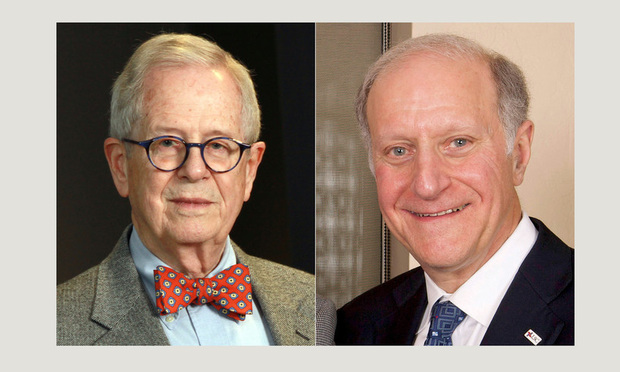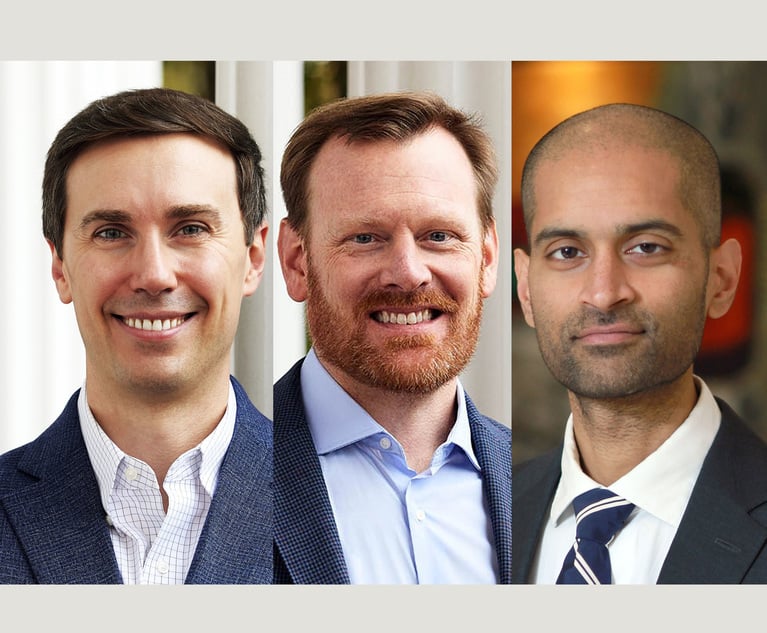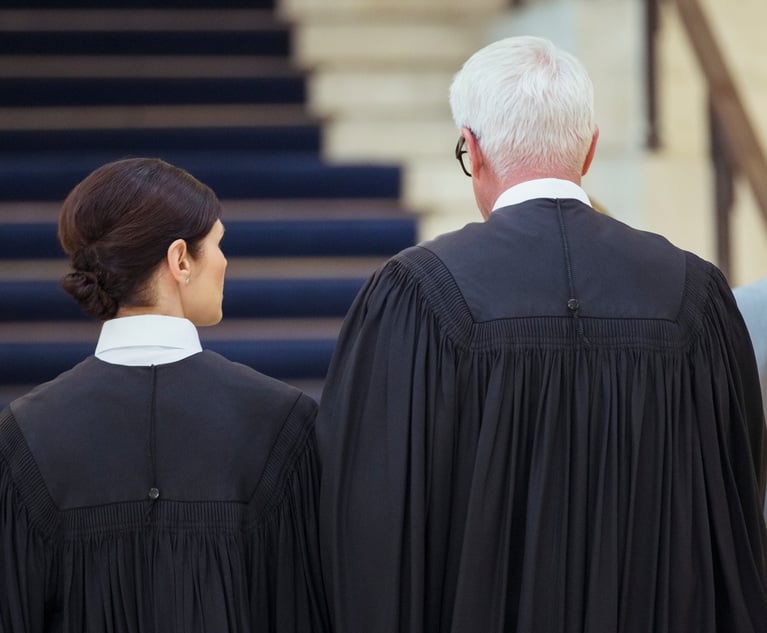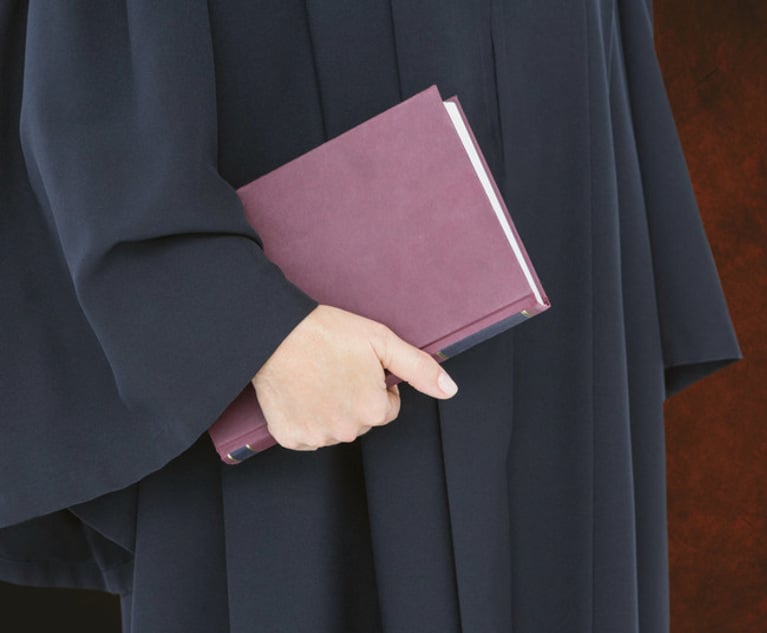Olmstead’s 20th Anniversary: Much Progress, but Continued Advocacy Needed
"Since this decision, which some have called the Brown v. Board of Education of the disability rights movement, much has changed for the good ... [but] many have fallen outside its light."
August 08, 2019 at 01:15 PM
5 minute read
 Frank Strickland (left) and John Levi (Courtesy photos)
Frank Strickland (left) and John Levi (Courtesy photos)
Twenty years ago, the U.S. Supreme Court changed the landscape of disability law in this country with the landmark decision in Olmstead v. L.C. and E.W. The case was brought by Atlanta Legal Aid—a Legal Services Corp. grantee—and involved two women who had been cycling in and out of Georgia’s state psychiatric hospitals due to an inadequate state-funded community service system. In the two decades since the decision, states have made great strides in transforming their community systems, making it possible for people with disabilities to live, work and play in the community. However, in order to ensure that all people with disabilities can thrive, we must continue to work on behalf of those in need.
In the 1999 Olmstead case, Legal Aid lawyer Susan C. Jamieson represented clients Lois Curtis and Elaine Wilson, arguing that, under the “integration mandate” of Title II of the Americans with Disabilities Act, their unnecessary segregation in institutions constituted disability discrimination. The court agreed. In the opinion, Justice Ruth Bader Ginsburg wrote that states are required to provide community-based services for people with disabilities when treating professionals say the placement is appropriate, the person with a disability does not oppose and the placement can be reasonably accommodated.
Since this decision, which some have called the Brown v Board of Education of the disability rights movement, much has changed for the good:
- Home and community-based services (an alternative to institutional care) are available in every state to some degree.
- The federal agencies that oversee Medicaid have issued regulations promoting better integration and now use terms like “person-centered planning.”
- Many states have an “Olmstead Plan” to make sure those in institutionalized settings can get “transition services” if they so choose.
Such changes have benefited people like Mary, a woman with a developmental disability and mental illness, who had lived for decades in state institutions, all the while longing to go back home to the small town where she had spent her early years. Mary found a Legal Aid lawyer who helped her obtain a community-based Medicaid waiver, and she is now living in a group home in her hometown, working and earning her own money, just as she had always dreamed.
Olmstead also transformed the life of Tanner, who has autism and does not use words to communicate. He had been living at home with his mother, who has multiple sclerosis and uses a wheelchair, but his behavior became so challenging and self-destructive that he would spend days in the emergency room. Tanner’s Legal Aid advocates represented both Tanner and his mother so they could get the community-based supports they desperately needed.
While Olmstead has been a beacon of hope for many people with disabilities, unfortunately many have fallen outside its light. Too many citizens do not know they have a civil right to community services, and only a lucky few have lawyers to assert that right on their behalf.
People with mental illness who are passing in and out of jail could be diverted from incarceration if they had access to robust community mental health services and supported housing. People with physical disabilities confined in nursing facilities could be supported in the community with what is often a cheaper community-based Medicaid alternative, but they are not given the choice before admission. People with intellectual disabilities who are working in “sheltered workshops” for less than the minimum wage could instead be working in jobs that are fully integrated in the community, if they had access to supported employment services.
Since 1999, lawyers and paralegals in the Disability Integration Project of Atlanta Legal Aid have made it their mission to ensure that community integration is a reality for all in the home state of Olmstead. Through their representation of both children and adults with disabilities, Legal Aid shines a spotlight on individuals who are simply seeking the support they need to live full and meaningful lives in their communities. Other stakeholders across the country are similarly focused on Olmstead, working tirelessly not only to free people from unnecessary institutionalization but also to promote fuller inclusion of people with disabilities in areas such as employment and education.
While the progress in the last 20 years has been remarkable—with thousands of people with disabilities becoming part of their communities accompanied by integrated state-funded support systems—we still have more work to do and must stand alongside people with disabilities and fight for this fundamental right. Olmstead is the key to the community, but the door is not yet open to all. By working together, we can expand community-based opportunities for people with disabilities, help them create and maintain economic independence and stay close to the family and friends they love.
John Levi is a partner at Sidley Austin in Chicago and has served as the chairman of the Board of Directors of the Legal Services Corp. since 2010.
Frank Strickland is a partner at Taylor English Duma in Atlanta and served as LSC board chair from 2003 to 2010. He currently serves on two LSC board committees.
This content has been archived. It is available through our partners, LexisNexis® and Bloomberg Law.
To view this content, please continue to their sites.
Not a Lexis Subscriber?
Subscribe Now
Not a Bloomberg Law Subscriber?
Subscribe Now
NOT FOR REPRINT
© 2025 ALM Global, LLC, All Rights Reserved. Request academic re-use from www.copyright.com. All other uses, submit a request to [email protected]. For more information visit Asset & Logo Licensing.
You Might Like
View All
Spalding Jurors Return $12M Verdict Against State Farm Insurance Client
10 minute read

Trending Stories
- 1'It's Not Going to Be Pretty': PayPal, Capital One Face Novel Class Actions Over 'Poaching' Commissions Owed Influencers
- 211th Circuit Rejects Trump's Emergency Request as DOJ Prepares to Release Special Counsel's Final Report
- 3Supreme Court Takes Up Challenge to ACA Task Force
- 4'Tragedy of Unspeakable Proportions:' Could Edison, DWP, Face Lawsuits Over LA Wildfires?
- 5Meta Pulls Plug on DEI Programs
Who Got The Work
Michael G. Bongiorno, Andrew Scott Dulberg and Elizabeth E. Driscoll from Wilmer Cutler Pickering Hale and Dorr have stepped in to represent Symbotic Inc., an A.I.-enabled technology platform that focuses on increasing supply chain efficiency, and other defendants in a pending shareholder derivative lawsuit. The case, filed Oct. 2 in Massachusetts District Court by the Brown Law Firm on behalf of Stephen Austen, accuses certain officers and directors of misleading investors in regard to Symbotic's potential for margin growth by failing to disclose that the company was not equipped to timely deploy its systems or manage expenses through project delays. The case, assigned to U.S. District Judge Nathaniel M. Gorton, is 1:24-cv-12522, Austen v. Cohen et al.
Who Got The Work
Edmund Polubinski and Marie Killmond of Davis Polk & Wardwell have entered appearances for data platform software development company MongoDB and other defendants in a pending shareholder derivative lawsuit. The action, filed Oct. 7 in New York Southern District Court by the Brown Law Firm, accuses the company's directors and/or officers of falsely expressing confidence in the company’s restructuring of its sales incentive plan and downplaying the severity of decreases in its upfront commitments. The case is 1:24-cv-07594, Roy v. Ittycheria et al.
Who Got The Work
Amy O. Bruchs and Kurt F. Ellison of Michael Best & Friedrich have entered appearances for Epic Systems Corp. in a pending employment discrimination lawsuit. The suit was filed Sept. 7 in Wisconsin Western District Court by Levine Eisberner LLC and Siri & Glimstad on behalf of a project manager who claims that he was wrongfully terminated after applying for a religious exemption to the defendant's COVID-19 vaccine mandate. The case, assigned to U.S. Magistrate Judge Anita Marie Boor, is 3:24-cv-00630, Secker, Nathan v. Epic Systems Corporation.
Who Got The Work
David X. Sullivan, Thomas J. Finn and Gregory A. Hall from McCarter & English have entered appearances for Sunrun Installation Services in a pending civil rights lawsuit. The complaint was filed Sept. 4 in Connecticut District Court by attorney Robert M. Berke on behalf of former employee George Edward Steins, who was arrested and charged with employing an unregistered home improvement salesperson. The complaint alleges that had Sunrun informed the Connecticut Department of Consumer Protection that the plaintiff's employment had ended in 2017 and that he no longer held Sunrun's home improvement contractor license, he would not have been hit with charges, which were dismissed in May 2024. The case, assigned to U.S. District Judge Jeffrey A. Meyer, is 3:24-cv-01423, Steins v. Sunrun, Inc. et al.
Who Got The Work
Greenberg Traurig shareholder Joshua L. Raskin has entered an appearance for boohoo.com UK Ltd. in a pending patent infringement lawsuit. The suit, filed Sept. 3 in Texas Eastern District Court by Rozier Hardt McDonough on behalf of Alto Dynamics, asserts five patents related to an online shopping platform. The case, assigned to U.S. District Judge Rodney Gilstrap, is 2:24-cv-00719, Alto Dynamics, LLC v. boohoo.com UK Limited.
Featured Firms
Law Offices of Gary Martin Hays & Associates, P.C.
(470) 294-1674
Law Offices of Mark E. Salomone
(857) 444-6468
Smith & Hassler
(713) 739-1250







